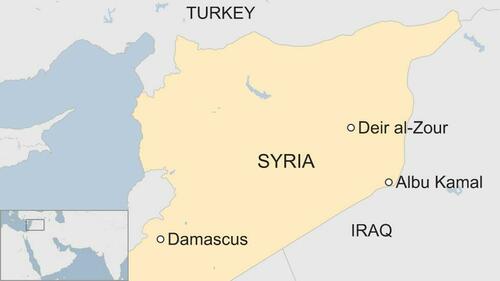Widespread reports, including observers on the ground, have indicated that Iran-backed Iraqi militias have been pouring across the border into eastern Syria to assist Damascus in repelling the Islamist militant advance after Al Qaeda splinter group Hayat Tahrir Al-Sham took over Aleppo this weekend.
A Syrian army officer has told Reuters that Iraqi militia forces crossing the border are "fresh reinforcements being sent to aid our comrades on the frontlines in the north."
Many of the fighters have been identified as belonging to the Kataib Hezbollah and Fatemiyoun groups. The US has long been in an internecine conflict with Kataib Hezbollah in Iraq, with over the years periodic rocket fire even targeting the US Embassy in Baghdad, as well as various bases which host remaining American troops.
The Iraqi militias have been staging in the area of Abu Kamal overnight. There were rumors that US warplanes attacked their positions, but these reports turned out to be untrue.
But these forces have been fully aware that the Pentagon could attack their convoys at any moment, and so have reportedly been crossing the border in small groups and using concealed roads.
"At least 300 fighters, primarily from the Badr and Nujabaa groups, crossed late on Sunday using a dirt road to avoid the official border crossing, two Iraqi security sources said, adding that they were there to defend a Shi'ite shrine," Reuters reports.
Iranian Foreign Minister Abbas Araqchi said on Monday that with regard to new fighting in Syria, "resistance groups will help and Iran will provide any support needed." Russia has been assisting with aerial bombardments.
To recap via a note from Rabobank:
On the geopolitics front the swift dismantling of Hezbollah by Israel, and Russia’s preoccupation with its war on Ukraine appears to have come at great cost for Syria’s Bashar al-Assad. 'Rebel' forces recaptured the country’s second largest city of Aleppo as regime troops were left somewhat stranded by Russian, Iranian and Hezbollah allies and were consequently overwhelmed by the Turkish-backed rebels.
In a situation similar to Yemen, civil war has been raging in Syria for 13 years without attracting a great deal of mainstream interest in Western media. In the case of Yemen, that all changed once the civil war impacted upon freight transits through the Suez Canal, while in Syria the ongoing competition for spheres of influence by Great Powers (Russia, USA, China, Saudi Arabia, Turkey, Iran, Israel etc) provides a useful microcosm of the new global paradigm, but only if one cares to look.
NEW: Iran-backed militias, including Iraq’s Kataib Hezbollah and Fatemiyoun groups, entered Syria overnight from Iraq.
— Clash Report (@clashreport) December 2, 2024
Dozens of Hashd al-Shaabi fighters crossed near Al Bukamal, with reinforcements heading to northern frontlines. pic.twitter.com/k73GFAZ23Z
In Lebanon, interestingly Hezbollah has said it does not plan to send its fighters "for now" to northern Syria to help Assad forces regain territory. Lebanese Hezbollah has of course been bogged down in over a year of fighting with Israel's military, which has included the last two months of an IDF ground offensive in the south.
Hezbollah was instrumental during the first ten years of proxy war in pushing out the US-Gulf backed jihadists; however, currently it looks like Assad's main help will come from Iran and Iraq.
President Assad was somewhat quiet throughout much of the Israel-Hezbollah war, and this could be at play in Hezbollah leadership's current reluctance to engage in the Syria theatre of the war. But it remains that the Lebanese Shia group is still desperately trying to rebuild its command structure and replenish its resources.
 via BBC
via BBCAs for the Iraqi militia presence in eastern Syria, they are likely to clash with the US-backed 'Free Syrian Army' and 'Syrian Democratic Forces' (SDF) in the area. It remains possible that US warplanes could engage as well.
Source link


